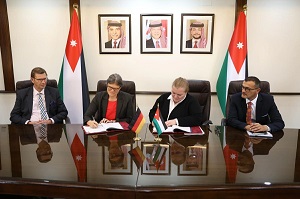Jordan’s economy shows resilience, sustains growth across key sectors - experts
The Jordan Times
AMMAN — Jordan’s economy has maintained a steady upward trajectory in 2025, demonstrating resilience and stability despite regional and global challenges and supported by strong performances in agriculture, industry, and services.
According to economic experts, this positive momentum reflects the impact of continuous Royal guidance, government facilitation measures, and prudent monetary policies that have balanced stability with growth, reinforcing investor confidence and optimism across the business community, the Jordan News Agency, PEtra, reproted.
Recent data showed steady improvement across multiple indicators, including GDP growth, exports, remittances, tourism revenues, foreign reserves, and foreign investments. The Amman Stock Exchange also recorded a stronger performance, accompanied by increases in registered companies, domestic revenues, and net corporate profits.
Economic specialist Ahmed Majali said Jordan’s real GDP grew by 2.8 per cent in the second quarter of 2025, driven by robust expansion in manufacturing, agriculture, transport, communications, and financial services. He noted that inflation remained low, reflecting monetary stability achieved through coordinated policies by the Central Bank of Jordan (CBJ) and the government.
Majali added that the CBJ maintained foreign reserves sufficient to cover more than eight months of imports and managed interest rates to support economic activity while preserving the stability of the Jordanian dinar. Government measures under the Economic Modernisation Vision also prioritised capital spending to stimulate investment and enhance project accountability, he said.
Economist Raed Tell highlighted that the government’s economic policies have helped sustain growth, with GDP rising from 2.7 per cent in the first quarter to 2.8 per cent in the second. He noted, however, that some sectors, particularly agriculture and industry, still require stronger incentives to unlock their full potential.
Expert Ghazi Assaf said Jordan’s economy has outperformed expectations despite regional instability, crediting sound fiscal and monetary policies and the successful completion of the fourth IMF review under the Extended Fund Facility programme. He called for continued structural reforms to address unemployment and public debt.
Economic expert Hossam Ayesh noted that Jordan has moved from absorbing the effects of regional instability to achieving tangible progress, supported by more than 1,000 government decisions taken over the past year. He said these measures have strengthened business confidence and aligned with the objectives of the Economic Modernisation Vision.
Ayesh added that with major national projects set to launch in early 2026, Jordan is preparing for a new phase of economic expansion, building on the solid foundations laid throughout 2025.
Latest News
-
 King to start visit to Japan on Saturday, first stop on Asian working tour
King to start visit to Japan on Saturday, first stop on Asian working tour
-
 ‘Israeli’ army announces new wave of attacks on Lebanon
‘Israeli’ army announces new wave of attacks on Lebanon
-
 NATO chief plays down US troop withdrawal from Romania
NATO chief plays down US troop withdrawal from Romania
-
 King listens to Parliament’s response to Speech from the Throne
King listens to Parliament’s response to Speech from the Throne
-
 Jordan, Germany sign €75M agreement to support economic modernization
Jordan, Germany sign €75M agreement to support economic modernization